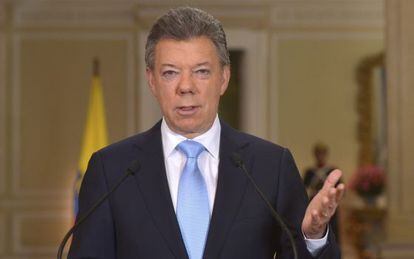Santos announces re-election bid to conclude peace process
The Colombian president urges all parties to settle disputes that have flared up around FARC negotiations

Just four days before the deadline for candidates to submit their papers, Colombia's President Juan Manuel Santos has decided to squash rumors and make an official announcement of his bid for a second term. He asked the Colombian people to give him a chance to consolidate the peace. "I am running because when you see the light at the end of the tunnel, you don't turn back," he said, in a short speech from the presidential palace.
Santos called on all political sectors, especially on opposition leader and former President Álvaro Uribe, to squash their squabbles and get behind the peace process that his government has been negotiating with the Revolutionary Armed Forces (FARC) for a year. "Peace is, without a doubt, the highest good in any nation," Santos said. "Peace should be above political bickering and stinginess. We should unite instead of separating," he said.
The elections will be a referendum on Santos' decision to opt for a diplomatic path out of the armed conflict and the contrasting philosophy of former President Uribe and his allies.
Uribe's party will fight to push through its candidate, Óscar Iván Zuluaga. Zuluaga has already said that, if he wins, he will put an end to the peace process.
We still face great challenges, but I am convinced that blood and fire is not the only way to solve them"
Santos defended his right, enshrined in the constitution in 2005, to seek re-election in order to give continuity to his policies. This time, he says, his goal is to make peace. During the campaign for his first term he promised to continue the government's efforts in "democratic security" which called for increasing security forces around the country to push back the rebels.
"We still face great challenges, but I am convinced that blood and fire is not the only way to solve them," Santos said in response to former Uribe's criticism. Uribe and supporters see negotiations as a gateway to impunity.
"Seven years ago the Colombian people gave the former president the opportunity to implement a series of security policies that proved successful," Santos continued. "We have reinforced them... Today I want that same opportunity - to consolidate peace and prosperity."
During his remarks he moved away from Uribe to say that as president it is his constitutional duty to make peace. "A president who rejects an opportunity to make peace would not only be irresponsible. He would be in violation of the Constitution and its people. Choosing more violence, more victims, more pain for thousands of Colombians is unacceptable," he finished.
The opposition argues that the insurgents can only be defeated through military operations and judicial due process.
The president confessed that the peace process is taking longer than he expected. Still, he said, they have signed unprecedented agreements. "My duty as president, my obligation as a Colombian citizen, is to prevent us from losing what we have achieved in the peace process."
Once he had announced his bid, Santos began to talk like a true candidate, taking advantage of the attention to review his term as president. He defended his main initiative - giving away thousands of homes to the poorest citizens and victims of violence. He highlighted the acknowledgment and reparations given to the victims. "For me it was undignified for the state to ignore them. We have begun making reparations," he said.
After his speech, his rivals attacked him. Oscar Iván Zuluaga focused on the failings of his policies. "I will seek peace by strengthening 'democratic security' measures and not by kneeling down before terrorism and 'castro-chavismo,' " in reference to the Communist regime in Cuba and Chávez's legacy in Venezuela.
Zuluaga emphasized that his peace would be a peace through justice and not a peace with impunity. His mentor, Álvaro Uribe, has used the same argument in his criticism of FARC negotiations.
Simón Gaviria, president of the Colombian Liberal Party, is one of the president's closest allies. He celebrated the news. Antonio Navarro, who ranks third in the polls, after Santos and Zuluaga, reacted differently. He may soon declare his candidacy for Green Alliance.
"To each according to his contribution," he said. "He has done a fine peace process and we believe it will bear fruit. However, we are worried that they are not prepared for the aftermath of the conflict."
Clara López, candidate for el Polo Democrático Alternativo or Democratic Alternative Pole, said the choice is not war or peace, Zuluaga vs. Santos. "The choice is between peace with continuity or peace with some changes, which is what we offer."
A win won't come easy for Santos. According to a Gallup poll, a little over 30 percent of voters would opt for a blank vote, meaning they determined that none of the candidates would be an adequate choice. To win in the first round in Colombia a candidate must obtain 51 percent of the votes. Gallup estimated that Santos would receive 27 percent, followed by Zuluaga with 14.9 percent.
Santos must convince millions of voters to choose him at the polls next May.
Translation: Dyane Jean François










































